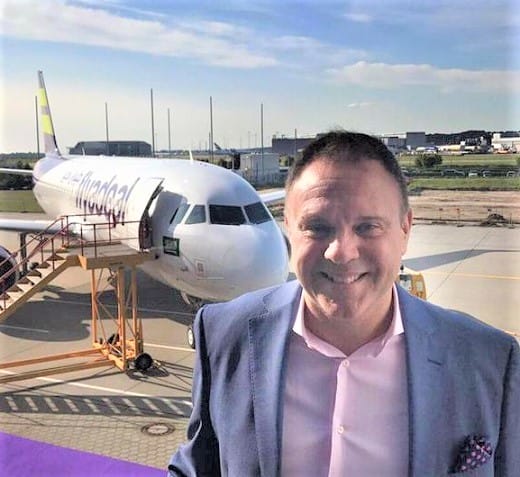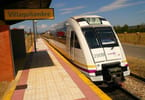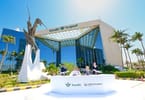- The Kingdom of Saudi Arabia began welcoming foreign tourists in September 2019 by launching a new visa regime for 49 countries.
- Saudi Crown Prince Mohammad bin Salman’s ambition is to move away from an oil-dependent economy and make tourism a key pillar.
- How flyadeal airline is working to meet that challenge on the heels of COVID-19.
Richard Maslen of CAPA Live spoke with Con Korfiatis, CEO of Saudia Arabian airline flyadeal, the Middle East’s newest airline based in Jeddah, which started up in 2017. They discussed the change in focus for the country to tourism, meeting the challenges of COVID-19, and how a young airline can help the nation to achieve its aviation goals. Following is the transcript of their discussion.
Richard Maslen:
Welcome to this latest airline CEO interview as part of the CAPA Live series. Today, I’m going to be speaking to Con Korfiatis, the CEO of flyadeal, a Saudi Arabian airline that’s part of the Saudi Group. Con, welcome to CAPA Live.
Con Korfiatis:
Hi, Rich. How are you doing? Good to see you again.
Richard Maslen:
I’m good. Thank you. So, over the next 30 minutes, we’re going to have a little bit of chat about aviation in Saudi Arabia. Talking about the vision of Saudi Arabia to open up its economy more, allow more visitors, and just diversify away from the oil and resource-based business that it previously had. We’ll have a little chat with Con about flyadeal, its establishment, how it’s grown and how COVID has affected its plans and how it’s looking into the future once international stability returns and airlines are enabled to grow again. So Saudi Arabia used to be a country that was really hard to access, very restrictive with its visa policy. But tourism is now a key pillar of Saudi Crown Prince Mohammad bin Salman’s ambitious reform strategy to move away from the economy that was oil dependent.
The kingdom opened its doors to foreign tourists in September 2019 by launching a new visa regime for 49 countries. And he wants the sector to contribute 10% of its gross domestic product by 2030. These are bold steps from a market that a lot of people have a lot of preconceived views about. So, Con, just to start, it’d be good to get a little bit of context into how this has all been working. It was early days before COVID struck, but there must’ve been some signs that you’re beginning to see if the market’s opening.
Con Korfiatis:
Absolutely. Good introduction, Rich. Look, an incredible time to be here, and really it was a big draw factor for me in coming to Saudi Arabia and to look at the flyadeal opportunity and bring it to life. I think, as you say, the kingdom has historically been a bit closed, certainly closed to tourism, open for business but I guess in some sort of restricted fashion or maybe just the business opportunities weren’t there in the same way. An economy that was predominantly resource-based albeit it still is and that still has a long lifeline ahead of it. It is looking longer term and saying, “Well, okay, what else do we need to do for long-term viability?” And really this is a country outside of being rich in resources, rich in so many other things.
It’s got some absolutely spectacular sites and places to visit. It’s got a magnificent ocean, it’s got mountains, it’s got parts of the country that gets snow Believe it or not. You’ve got some incredible dessert sites and architecture and history there. And really there are other industries to exploit also. You’ve got a large population. We have the largest domestic population in the GCC. It’s very well educated and qualified and certainly a number of other industries can survive and prosper here. I think the early ones we’re hearing about outside are quite infrastructure and tourism related, and that’s fantastic because clearly, we need to enable people to be able to come and explore and do business here, or holiday here or come here for religious purposes or any other reason unless you choose to come. And those opportunities are there to be exploited.
I guess, pre COVID the reason flyadeal came about is the Saudi Group saw a white space for a true low cost airline in the kingdom. And I would say the region, the Middle East is a little bit dearth of the type of low cost models you see so prevalent and having created such significant market penetration in places such as Europe and the Americas and the East Asia and around this region, not as much yet. And so very ambitious, aggressive, and certainly needs infrastructure and transportation to keep pace with that. Otherwise, they’ll never deliver on the kind of numbers that they would like to achieve by 2030.
So here we are flyadeal we turned three in September last year, so we’re still a young airline. We bolted out of the boxes in late ’17, on National Day when we started services and very quickly grew to 11 new Airbus 320ceo aircraft. We’ve stalled a little bit since then, partly because of a change in sort of narrow body direction in ’19, which slowed down our ability to take some more aircraft quickly. And then in ’20, where we’d hoped to grow quite aggressively in terms of fleet growth and destinations it didn’t eventuate because of the crisis that we’re living at the moment. And we’re still not really sure when we’ll completely get through. So perhaps just to sum up where we’ve got to be over that three years.
So today as we stand with 12 aircraft, we took our first NEO last year, we’re about to reach a 10 million passenger milestone in terms of the number of people we’ve carried. We still are a domestic operator, but we do have designs on being international sometime this year. So domestic and we’ve become in that timeframe the second largest airline domestically, which really for the period we’ve been around is really quite an amazing feat. And a testament to the market really being ready for a true low cost product and the public taking to it.
Richard Maslen:
It’s really interesting Con. And obviously, you mentioned about a large growth and looking very positively, obviously the start of 2020 hit everybody with a lot of shock, no one was anticipating what had happened. How did this impact you? And how has Saudi Arabia worked to actually manage the spread of COVID?
Con Korfiatis:
There’s been no playbook for what we’ve lived through in 2020, and the world has had to innovate and adapt and be really agile considering the dangers being faced in terms of how you… Well, I guess as a humanity, but also as a geography and business as well, we were no more or less immune than anywhere else. We went into a complete lockdown in late March. It started it being internationally locked down. That was I think about the third week of March and not even a week later we became domestically locked down as well. So, all flights into and out of the kingdom and domestically in the kingdom and all public transportation ceased effectively overnight, and that lasted for about two and a half months domestically on the 31st of May we were allowed to come back domestically. But just before I get to that period, I think in that lockdown period, it was quite severe.
And we had curfews people couldn’t travel more than two kilometers from home base and lots of measures that you saw in many parts of the world. The kingdom moved quickly and swiftly and quite conservatively in terms of the measures being adopted. And really, I think the tremendous results and low COVID statistics we’ve had here since last year are a testament to those measures being appropriate as much as they might’ve been frustrating from a business point of view and other points of view where people are really avid travelers here, for example, and to be completely locked down to something quite foreign here locally, so we had to get through that period. Conservatively, domestic flights were reintroduced at the end of May. We had COVID measures, we still do on board. In our case as a narrow body operator we’re not allowed to sell the middle seat and on the wide body flights they can’t sell a seat next to a seat sold.
And so, there’s been onboard restrictions. There’s obviously been measures around airports themselves and how you flow in and out through different checkpoints on and the like, and the airports were slot constrained. We were only allowed to come back to 20% of the frequency in the beginning and that’s progressively ramped up. So, it’s been a slow introduction, but remarkably, what we’ve found is a very robust appetite for domestic travel. Business came back, religious traffic was still depressed because the main religious sites over on the side of the country we live in were still closed. So initially it was business, there was a bit of [inaudible 00:08:42] coming back and interestingly a development of a domestic tourism business given people couldn’t travel internationally. And so fast forward about a year on now we’re back to at least in flyadeal’s case to about 90% of the frequencies we were doing before.
And since day one, actually through that buildup our flights have been full. The seats were allowed to sell we fill, and that’s not just our experience, but it’s the other local airlines experience as well. It’s been a very robust domestic market. And in our case, we’re blessed in that we were just a domestic operator pre the lockdown. We hadn’t embarked on an international journey nor have a significant portion of our fleet that was dedicated to international. So, we’ve done remarkably well in a very, very difficult environment to the point where flyadeal has kept its full staffing through the crisis, kept everybody employed and kept everybody busy. And we’re very fortunate to have been in a market and an operator of the size that we’ve been able to achieve that, so we’re pleased. We’re looking forward hopefully to some brightest guys ahead this year, but it’s still a bit early to tell.
WHAT TO TAKE AWAY FROM THIS ARTICLE:
- Look, an incredible time to be here, and really it was a big draw factor for me in coming to Saudi Arabia and to look at the flyadeal opportunity and bring it to life.
- I think, as you say, the kingdom has historically been a bit closed, certainly closed to tourism, open for business but I guess in some sort of restricted fashion or maybe just the business opportunities weren’t there in the same way.
- I think the early ones we’re hearing about outside are quite infrastructure and tourism related, and that’s fantastic because clearly, we need to enable people to be able to come and explore and do business here, or holiday here or come here for religious purposes or any other reason unless you choose to come.























